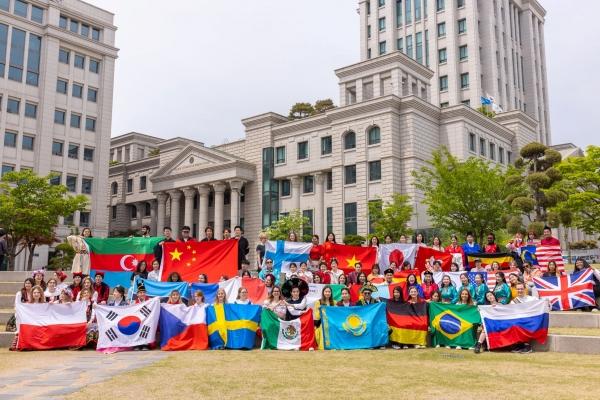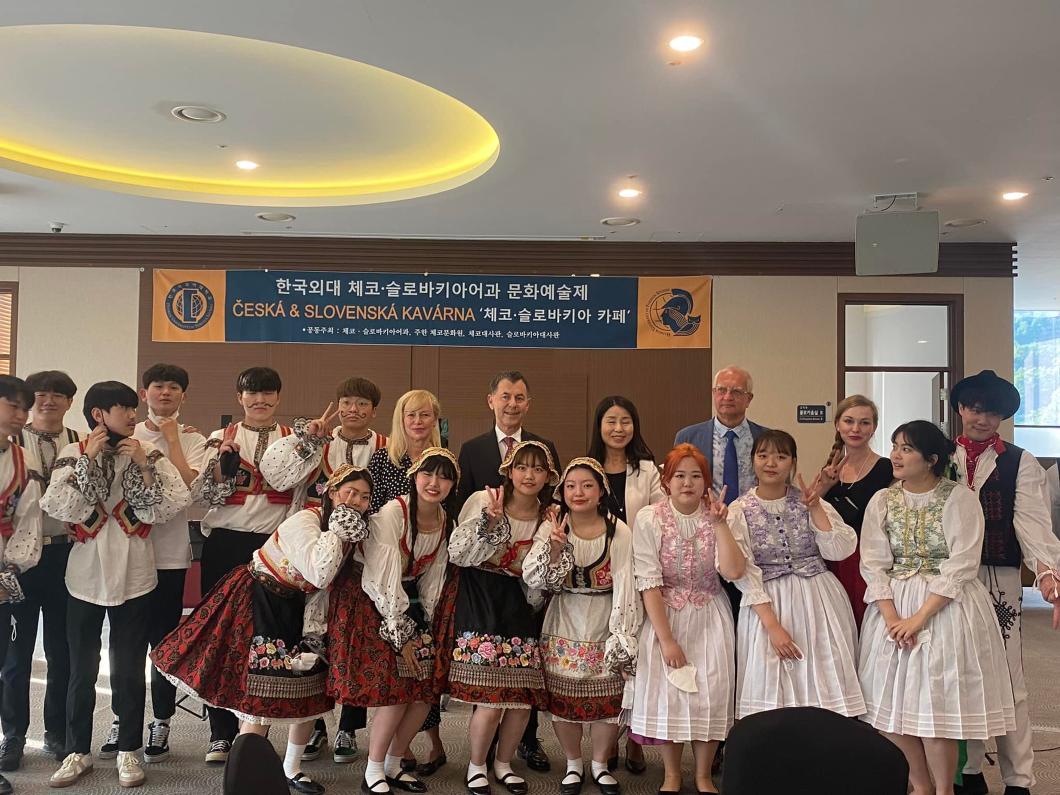Bohemian studies in the Republic of Korea
Bohemian studies in the Republic of Korea
24.08.2023 / 10:37 | Aktualizováno: 06.09.2023 / 12:08
There is only one university where you can learn the Bohemian Studies in Korea, which is the Department of Czech and Slovak Studies at the Hankuk University of Foreign Studies (HUFS). HUFS (https://hufsenglish.hufs.ac.kr) is a private university which has one of the largest number of students in Asia. It provides undergraduate studies and, exceptionally, if there is sufficient interest, a master's degree as well.

Hankuk University of Foreign Studies, or HUFS, was founded in 1954 and is widely regarded as the best institution for foreign language education and internationalization in Korea. The university has established cooperation with 543 universities in 93 countries. HUFS offers 68 doctoral, 85 master's and more than 100 bachelor's programs.
The university has two campuses: the main campus in Seoul and the global campus in Yongin, Gyeonggi-do Province, (about 60 minutes from Seoul) The global campus serves as the campus where most foreign languages are currently taught with 43 foreign language departments as of today.
the Department of Czech Language was established at HUFS in October 23, 1987. Among the founders of the department is former HUFS Vice President Emeritus Professor KIM Kyu-Jin (e-mail: kyuchink@hanmail.net), who still strongly supports Czech studies.
In 2005, Slovak language was also taught at the university and the department was renamed the Department of Czech and Slovak Studies (e-mail: hufsczsk@gmail.com) within the so-called "College of Central and East European Studies". There is a regular, usually four-year rotation of the position of Head of Department. Currently, the Head of Department is Professor YU Sunbee (e-mail: yusb@hufs.ac.kr). The department has several Korean teachers speaking Czech, two Czech teachers and one Slovak teacher.

Internally, the department is headed by Prof. Darina Ivanovová (e-mail: darina.ivanovova@ff.cuni.cz), who has been a full professor at the department since August 2021. She is a graduate of the Faculty of Education of the University of West Bohemia in Plzeň, majoring in Russian language and literature. After graduating in 1988, she worked for 10 years at the Institute for Language and Preparatory Studies of Charles University in Prague. Since 1998, she has worked as a lecturer at the Institute of Bohemian Studies of the Faculty of Arts of Charles University in Prague (now the Institute of Bohemian Studies for Foreigners and Communication) for more than 20 years, with which she still cooperates closely. During this time she published several textbooks in Czech for foreigners. She founded the "Czech Studies online programme" at the Faculty of Arts of Charles University. Her current experience abroad includes the Beijing University of International Studies in China and the University of Tampere in Finland. For several years, she has worked as a secretary for lecturers and methodology at the Summer School of Slavic Studies.
Since March 2023, another Czech lecturer, Prof. Lucie Park (e-mail: park@czech.cz), who also works part-time at the Czech Center in Seoul and at the Korean representative office of the Frýdek-Místek company Marlenka, which produces honey cakes.
Both native Czech teachers, in addition to the language itself, translation and interpretation, also try to emphasize the inclusion of Czech realities and cultural and social competences in general, which are often more important for mutual understanding than the language itself.
The academic year in the Republic of Korea begins in March and ends in December. Approximately 34 new students enters every year to study our language, with some students transferring from other universities. Most students study Czech in combination with another subject, mostly economics or another language. In the academic year 2023, a total of 138 students are studying at the Department, of which 36 students are in the 1st year, 24 in the 2nd year, 26 in the 3rd year and 52 in the 4th year and above.
A number of Korean Bohemia students undertake study or work placements in the Czech Republic during their studies, mostly with branches of Korean companies. In terms of funding, study internships are of three types:
1) scholarships funded by the Czech state,
2) scholarships funded by the university and
3) self-funded.
Students who complete internships in the Czech Republic usually achieve a higher language level and are motivated to use Czech in their future working career. During their stay in the Czech Republic, they take advantage of the opportunity to take the Czech Language Certificate Exam (CCE). This opportunity is also available directly at HUFS in cooperation with the Czech Center Seoul and the UK Department of Education, starting in autumn 2023, at A2 and B1 level.

Czech teachers and the HUFS Department of Czech and Slovak Studies also work closely with the Czech Embassy in Seoul. There are regular interactions during the so-called "Czech and Slovak Kavárna (Cafe). Students also attend events organized by the Embassies of the Czech Republic and Slovakia and the Czech Center in Seoul, some of which are organized directly for them (lectures, discussions with interesting personalities, etc.).
The Department of Czech and Slovak Studies has its own dance and folklore ensemble Polka, which participates in various competitions, singing and dancing festivals, thus presenting Czech culture at various Korean cultural events with international participation.
HUFS and, especially, its Department of Czech and Slovak Studies contributes to spreading the good name of the Czech Republic in the Republic of Korea through its activities. Every year, many graduates of Bohemian Studies are employed by Korean companies that cooperate with Czech companies and thus help to overcome the mutual language and cultural barrier between the Czech Republic and the Republic of Korea.
(Last updated 24 August 2023)
